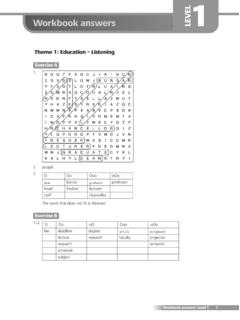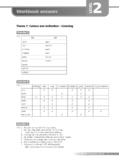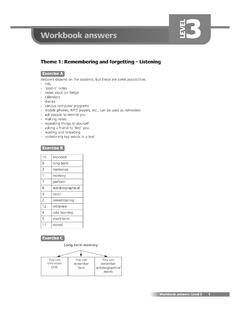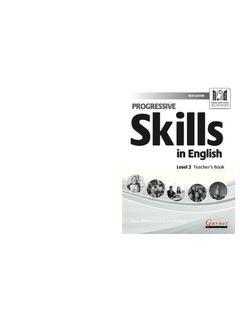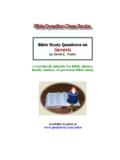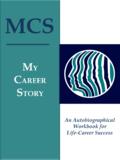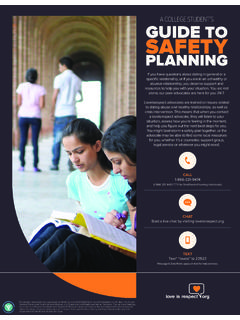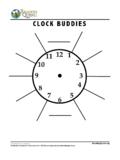Transcription of Workbook answers - Skills in English
1 Theme 1: Remembering and forgetting Multi-store memory model was proposed in The first stage of memory is paying Short-term memory only lasts about 20 We can rehearse information by repeating There are five ways of moving information into long-term Teachers asked children to memorize many dates at one Can you remind me of your telephone number?h. People sometimes lose their memories after an AExercise BExercise C Workbook answers : Level 3 1 Workbook answers 3 LEVELOoooOofrequencycomponentmemorizeatt entionrecognizeconnectionsensorymnemonic rehearsalrelatedrememberresearcheran idearesearchinformationdatesa personyour memoryattentionpropose3conduct3lose333fo rget33memorize33pay answers depend on I forgot to give/ giving / giveher the She remembered to put / putting/ puther phone in her handbag but it wasn t I learnt how to swim/ swimming / swimwhen I was very He reminds me of/ of me / me tohis Did you remember to take/ taking / takethat library book back?
2 F. Remind me to call/ calling / callhim when we get I ve forgotten how to use/ using / usethis What did you learn of / about/ toin the last lecture?a. EExercise FExercise D2 Workbook answers : Level 3a. I don t know if he s he English ?b. I m not sure if the lecture is in Room the lecture in Room 3?c. I ve forgotten if we have a test this we have a test this week?d. Do you know where she lives?Where does she live?e. Have you got any idea when the talk finishes?When does the talk finish?f. I m going to discuss how children do children learn?g. First, we ll see what Aristotle did Aristotle think?h. Then, I ll tell you how Piaget researched this did Piaget research this subject?i. Today, I ll explain why people are worried about climate are people worried about climate change? can you do to move / moveinformation into long-term memory? There is / arefive main , we have / are havingfrequency.
3 So, for example, when you hear a new word, you can say it toyou / yourselften times. But other researchers say repetition is not / isenough. You need variety also /as well. For example, you need to read a / -new word in several different situations. Then you need tohear it / themin some more situations. Then, perhaps, you need to use / usingit yourself. The third ideais activity. More than 2,000 years ago, Aristotle wrote a book called / is called Ethics. Aristotle said thatwe learn by doing / do. Association is the fourth / fouridea. A man called Tony Buzan writes / wroteawell-known book in 1993 called The Mind Map Book. In this book, Buzan says that it is very / tooimportant to make associations between pieces of information. His / He smain method is the mindmap. You draw lines to link / linkinformation. Finally, we have the idea of / formnemonics. Amnemonic is a clever way of remembering / remembersomething. For example, perhaps you want toremember / rememberingthe names of the nine planets in our Solar System.
4 There / Itis a well-knownmnemonic for this in English : My Very Efficient Memory Just Stores Up Nine 1: Remembering and forgetting I haven t beenhere for a week. b. Have you metyour tutor yet?c. Which days do you have lectures?d. What are you having to drink?Exercise AExercise BExercise G Workbook answers : Level 3 31. aloud4annoying2. aural8corridor3. prefer9here4. noisy1how5. mode3learner6. improve5so7. tidy7style8. because2talk9. clearly6usee. Have you gota map of the town?f. Do you have any suggestions?g. I have lostmy key so I can t get into my OK. I have explainedthe main problems. In the next lecture, I will .. answers depend on At the end of the talk, you should make some recommendations. How can we learn more efficiently?b. Could you explainthis assignment to me? I don t understand How do you preferto receive new information? What is your main learning style?d.
5 I suggestthat we brainstorm first and then start making some It is important to organizeyour ideas Kinaesthetic learners learn new information through Remember to evaluateyour talk at the end. What did you do well?h. Who is going to do the first presentation?i. You should try to improveyour learning efficiency. Try different ways of Don t forget to end your talk with a shouldn t be late for You should go to bed early the night before a You should respect You should have a healthy You should read this DExercise EExercise FExercise C4 Workbook answers : Level 3verbnouna. ex'plainexpla'nationb. im'proveim'provementc. 'move'movementd. pre'sentpresen'tatione. 'organizeorgani'zationf. pre'fer'preferenceg. reco'mmendrecommen'dationh. e'valuateevalu'ationi. su'ggestsu'ggestionj. con'cludecon'clusion Workbook answers : Level 3 5f. If you are ill, you shouldn t go to the I should go People should do assignments on their answers depend on could phone your friend with your could climb in through the could break a window with a could call a could put your hand through the letterbox and try to open the door from the could go and stay at a could wait (or sleep) in your could try to pick the lock with a depend on 1: Remembering and forgetting Readingbeginning /end,better / worse, change / stay the same, decrease / increase, difficult / simple, fall / rise,forget / remember, go / remain, noisy / quiet, put into / take out of, store / retrieveExercise AExercise GExercise HExercise Bnounverbadjective1.
6 (s); understoodunderstandable2. (s)/(ed); remind3. (s)4. (s)/forgot/forgottenforgetful5. (s)/lostlost 6. (s)/(ed)informed7. (es)/(ed)6 Workbook answers : Level 31. The human brain cannot remember everything. Forgetting is a natural Research shows revision is the key to It is important that information is retrieved, used and We must repeat the cycle of retrieval use In other words, we need to have regular We must do this at regular intervals ten minutes, one day, one week, etc. Mace called this spacedrepetition .7. But the general word for the process is revision. 1. The arrival of gunpowder in Europe | led to | the end of castles. 2. The southern part of the country has many permanent rivers which provide drinking water. 3. The men and women from the winning team carry flags from the different areas of the city. 4. Recent studies at a number of universities show the importance of stable family CExercise DExercise EExercise reviewreviewf.
7 Processprocessi. noisenoisyf. introductionintroductoryi. differencedifferent1. internal4brain2. attention1/8factors3. natural6grade4. human9intervals5. revision8opinion6. test5/6period7. learning3/8processes8. scientific8/10research9. regular2span10. recent7styleSVOSSVVOOSVO Workbook answers : Level 3 7 5. Children under the age of ten cannot usually understand mathematical problems which involve algebra. 6. The best-known research in the area of short-term memory was conducted by Miller in his 1956 studycalled The Magical Number Seven,Plus or Minus Two .1. a. Percentage of learning Education Research Percentage of learning remembered with no About five per You actually learn more than you learnt at the time of the answers depend on a. False. It shows the percentage of revision Truec. Trued. False. You remember things better from the beginning of a revision period than the Truef.
8 False. You should take a break every 1: Remembering and forgetting Writing1. researcher2. rehearsal3. retrieval4. theory5. demonstrate6. usage7. foreign8. experiment9. believe10. argument3. store4. show5. lead6. hard7. holdExercise AExercise GExercise BSSVVOO8. court9. bump into10. fit1. People changed some of the words, for example, canoebecame Research has shownthat new information does not stay long in short-term Discuss, with referenceto research into Generally speaking, leading questions are not allowed in Fairy stories, such as Cinderella , are common in Western In many cases / instances, people will put the same words in the mouths of the They said there was broken glass when, in fact, there was This means / shows / demonstratesthat there is a difference between storage and In thisessay, I have explained the importance of rehearsal in vocabulary The questions for all the groups were the same, except CExercise D8 Workbook answers .
9 Level 3 12345678910111213141516 W I T H O U TE X T R E M E L YO V E RI N V O L V EI M P O R T A N C ET H E S I SR E C O M M E are many ways to take notes from a One excellent way was developed by Walter Pauk at Cornell University in the United This method requires large, loose-leaf notebooks with holes for You can organize the notes in ring You can take out the notes and rewrite The method, which is now called the Cornell system, is based on the page layout in Figure You divide up the page into three The first area is a column, 6 cms wide, on the left side of the This part is called the cue area and you put key questions in The main part of the page is the note-taking There is a row, 5 cms high, at the bottom of the This part is the summary area and is completed after the depend on 2: Friends and family EExercise FExercise A Workbook answers : Level 3 9a.
10 Allow1soundb. approve7threec. honest2you d. support3gote. available4fourf. adolescent9went g. believe5wayh. argue6teni. accept10sixj. are people that we know them from school or college, from the clubs that we go to, from the places that we work in, orfrom our local meet them on family see them around and we say hello, how are you?But there is a big difference between an acquaintance and a An acquaintance is someone you know, but a friend is someone you You can accepta person s actions but not approveof their Tellis one-way I tell you something. Communicateis two-way. I say something and you Womenis a general word for females. Ladiesis a polite word. We also use it on toilet doors!e. A colleagueis someone you work with, but your bossgives you Areais a general word for a part of a town, city or country. Neighbourhoodis where you DExercise CExercise B10 Workbook answers : Level 3 OoooOoooOa. barrier3b. acceptance3c.
